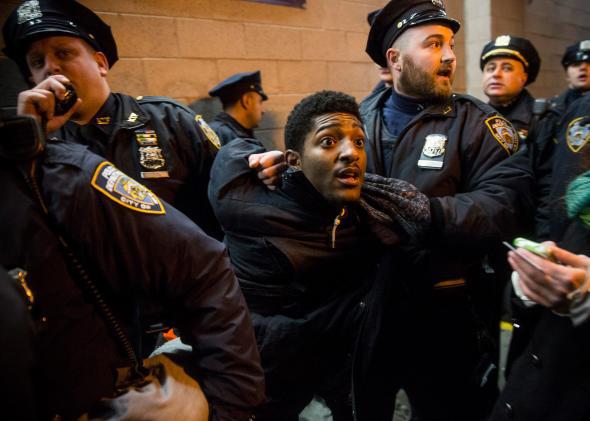Wikipedia is quickly and quietly becoming the newest battleground in the struggle over police malfeasance. Last week, the San Diego Union-Tribune reported that users within the San Diego police department—some of them anonymous—had edited their department’s page to remove information from the “Misconduct” section. Not long before, Capital New York discovered that numerous IP addresses associated with the NYPD had been used to edit entries on departmental brutality.
Wikipedia discourages what it calls “conflict of interest editing,” revisions to the encyclopedia made by those with a direct interest in the topic under review. As the site’s guidelines explain, such edits are incompatible with “the aim of Wikipedia, which is to produce a neutral, reliably sourced encyclopedia.” William Beutler, author of the blog the Wikipedian, explains that, however controversial, these changes by police representatives are not necessarily exceptional. Since “most editors gravitate toward topics they are interested in,” he writes, some conflict is almost inevitable. Nevertheless, in context the edits by the SDPD and NYPD remain deeply troubling, constituting what Gizmodo rightly calls “blatant attempts to bend the narrative on horrific state-administered brutality.”
Computers play an increasingly central role in the way that law enforcement officers interact with the public. As such, departments are obliged to recognize that the way their employees and other representatives conduct themselves online reflects on the agency as a whole. This has become especially clear with regard to social media. As one sample social media policy notes, those affiliated with a law enforcement agency effectively speak on its behalf whenever they post “during work hours” or “using agency equipment,” even if they don’t actively identify their connection with it. While this is critically important on Twitter or Facebook, it is just as true on the rest of the Internet.
In a statement to the Union-Tribune, a representative of the San Diego Police Department denied any responsibility for the edits. “The editing of content found on the Wikipedia page regarding the San Diego Police Department is not, nor has it ever been, assigned to any Police Department Personnel,” he said. But whether or not these editors were acting on the orders of their superiors, they were doing so in an implicitly official capacity, precisely because they were employing the department’s technology and working through Internet connections that it owned.
You don’t need to endorse Wikipedia’s own policies, then, to recognize that these edits were problematic. To the contrary, they can and should be understood as quasi-official cover-ups, attempts to deceive the people these departments ostensibly serve.
One SDPD-affiliated Wikipedia editor told the Union-Tribune that he made changes because he was frustrated by the ways that “the sometimes untrue or misrepresented actions of [a] few” officers had been used to denigrate the department as a whole. But, that’s precisely what’s at issue: When they assume their official roles, whether on the street or online, officers do represent the department as a whole, and their conduct should reflect on the department. To deny this fact is to abet the forces that underwrite police violence by shunting off any misdeeds onto individual bad seeds, while ignoring the structures that empower them to commit those actions in the first place.
Police departments need to admit that they are responsible for the actions, good or bad, of their officers. Acknowledging that their employees should stay off of Wikipedia pages connected to their work may be a small step in that direction, but it’s an important one. If your police department doesn’t have a Wikipedia policy, you should probably worry. There’s no telling what else they might be denying.
